
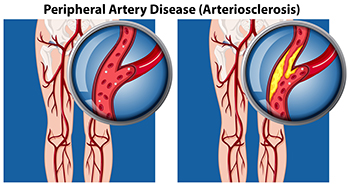
Peripheral artery disease involves impairment of the blood flow through the arteries to upper and lower extremities, like the feet. With this condition, the peripheral blood vessels narrow which decreases blood supply and oxygen to tissues within the legs and feet. Without proper blood flow, cells in your legs and feet cannot perform their functions well and may die. This, in turn, can lead to symptoms ranging from pain to gangrene, and the latter if left untreated could result in amputation. This condition affects both genders and is more common in older people. The main symptom of this disease, if there are any symptoms at all, is pain. An examination will involve looking for signs of trauma, muscle wasting, swelling, redness, absent hair patches, shin abnormalities such as staining, inflammation, or shininess, and ulcers on the foot or leg. Given the severity of complications arising from peripheral artery disease, regular visits to a podiatrist, especially as one ages, are recommended to diagnose and properly treat this disease before it becomes life-threatening.
Peripheral artery disease can pose a serious risk to your health. It can increase the risk of stroke and heart attack. If you have symptoms of peripheral artery disease, consult with one of our podiatrists from Achilles Foot Clinic. Our doctors will assess your condition and provide you with quality foot and ankle treatment.
Peripheral artery disease (PAD) is when arteries are constricted due to plaque (fatty deposits) build-up. This results in less blood flow to the legs and other extremities. The main cause of PAD is atherosclerosis, in which plaque builds up in the arteries.
Symptoms
Symptoms of PAD include:
It is important to note that a majority of individuals never show any symptoms of PAD.
Diagnosis
While PAD occurs in the legs and arteries, Podiatrists can diagnose PAD. Podiatrists utilize a test called an ankle-brachial index (ABI). An ABI test compares blood pressure in your arm to you ankle to see if any abnormality occurs. Ultrasound and imaging devices may also be used.
Treatment
Fortunately, lifestyle changes such as maintaining a healthy diet, exercising, managing cholesterol and blood sugar levels, and quitting smoking, can all treat PAD. Medications that prevent clots from occurring can be prescribed. Finally, in some cases, surgery may be recommended.
If you have any questions, please feel free to contact one our office, located in the South of Calgary, Alberta. We offer the newest diagnostic and treatment technologies for all your foot care needs.

If left untreated, an ingrown toenail can lead to more serious concerns, such as an infection. Knowing proper nail care can help in the prevention of an ingrown toenail. Give us a call, and get treated!
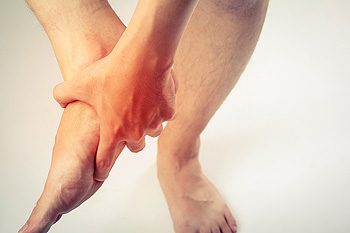
While much foot pain is due to an injury or other underlying condition, sometimes foot aches and pains are simply a result of spending too much time on your feet. One of the best ways to ease everyday foot soreness is to get off your feet, elevate them, and apply an ice pack to the part that hurts most. Being proactive can also help. If you know you will be standing or walking for long periods, wear shoes that fit properly, offer good support, and are appropriate for the activity. A cushioned shoe insert might be helpful. Your sore feet may also benefit from stretching and strengthening exercises. A warm foot bath can revitalize your feet, as well as relieve pain from gout, sprains or bruises. Maintaining a healthy body weight is another way to reduce pain from the pressure of standing for a long time. For continued relief, wearing compression socks and investing in custom orthotics that can be made by a podiatrist are two more ways to reduce the likelihood of chronic foot pain. If your foot pain continues, despite these measures, it is a good idea to see a podiatrist for an examination, diagnosis, and further treatment options.
Foot Pain
Foot pain can be extremely painful and debilitating. If you have a foot pain, consult with one of our podiatrists from Achilles Foot Clinic. Our doctors will assess your condition and provide you with quality foot and ankle treatment.
Causes
Foot pain is a very broad condition that could be caused by one or more ailments. The most common include:
Diagnosis
To figure out the cause of foot pain, podiatrists utilize several different methods. This can range from simple visual inspections and sensation tests to X-rays and MRI scans. Prior medical history, family medical history, and any recent physical traumatic events will all be taken into consideration for a proper diagnosis.
Treatment
Treatment depends upon the cause of the foot pain. Whether it is resting, staying off the foot, or having surgery; podiatrists have a number of treatment options available for foot pain.
If you have any questions, please feel free to contact one our office, located in the South of Calgary, Alberta. We offer the newest diagnostic and treatment technologies for all your foot care needs.
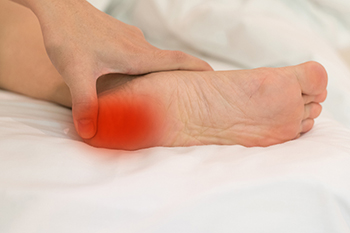
Children often complain of heel pain, and it is usually not serious. However, it is important to understand what is going on as such pain can arise for various reasons. If a child suffers from pain or tenderness in the back of the foot or ankle, limps, or walks on their toes, they might have Achilles tendonitis or Sever’s disease. Achilles tendonitis is an inflamed Achilles tendon. Sever’s disease, or calcaneal apophysitis, affects kids from five to eleven years of age and involves the Achilles tendon pulling on a growing heel bone. Both conditions can occur from overuse or a sudden increase in activity. Children performing repetitive movement as in sports like soccer, basketball, and track that involve running or jumping are more prone to heel pain. Rest, ice, compression, elevation, stretching, over-the-counter pain medication, and perhaps cushioned heel lifts usually provide relief, but ignoring symptoms can lead to worsening of the injury and sometimes chronic pain. Other less common reasons for heel pain in children are plantar fasciitis, fractures of the heel or foot, infections, tumors, or congenital problems. If one suspects a child has sustained a fracture or if pain persists beyond a couple of weeks, a podiatrist should be seen to examine your child’s feet, determine what the cause of pain is, and suggest an appropriate treatment plan.
Many people suffer from bouts of heel pain. For more information, contact one of our podiatrists of Achilles Foot Clinic. Our doctors can provide the care you need to keep you pain-free and on your feet.
Causes of Heel Pain
Heel pain is often associated with plantar fasciitis. The plantar fascia is a band of tissues that extends along the bottom of the foot. A rip or tear in this ligament can cause inflammation of the tissue.
Achilles tendonitis is another cause of heel pain. Inflammation of the Achilles tendon will cause pain from fractures and muscle tearing. Lack of flexibility is also another symptom.
Heel spurs are another cause of pain. When the tissues of the plantar fascia undergo a great deal of stress, it can lead to ligament separation from the heel bone, causing heel spurs.
Why Might Heel Pain Occur?
Treatments
Heel pain should be treated as soon as possible for immediate results. Keeping your feet in a stress-free environment will help. If you suffer from Achilles tendonitis or plantar fasciitis, applying ice will reduce the swelling. Stretching before an exercise like running will help the muscles. Using all these tips will help make heel pain a condition of the past.
If you have any questions, please feel free to contact one our office, located in the South of Calgary, Alberta. We offer the newest diagnostic and treatment technologies for all your foot care needs.
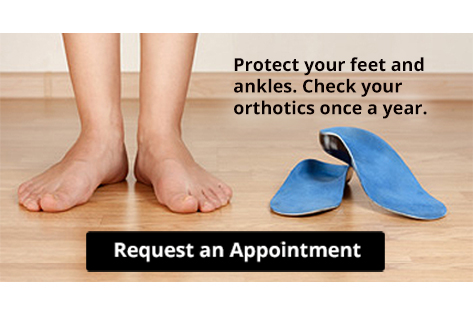
Custom orthotics, or shoe inserts, should be periodically replaced. Orthotics must fit properly to give you the best results. Protect your feet and ankles!
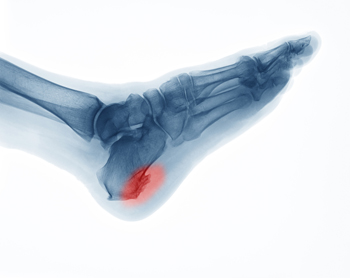
Heel spurs, also referred to as calcaneal spurs or osteophytes, are calcium deposits that develop on the heel bone over time. They typically form in response to chronic strain or tears to the plantar fascia tissue that connects the heel with the toes, or to damage to the heel bone membrane. Other factors that may contribute to heel spurs developing include obesity, wearing improper shoes, age, trauma, training on hard surfaces, or having plantar fasciitis (damage to the plantar fascia) or certain medical conditions. Heel spurs develop on the part of the heel that is closest to the arch, and they point towards the middle of the foot. Heel spurs can be up to a half inch long and are usually only detectable with an X-ray. Heel spurs are usually not painful. When they are, a podiatrist can treat them with rest, ice, orthotic devices and/or shoes, anti-inflammatory medication, cortisone injections, or even surgery if necessary (to remove the spurs).
Heel spurs can be incredibly painful and sometimes may make you unable to participate in physical activities. To get medical care for your heel spurs, contact one of our podiatrists from Achilles Foot Clinic. Our doctors will do everything possible to treat your condition.
Heels Spurs
Heel spurs are formed by calcium deposits on the back of the foot where the heel is. This can also be caused by small fragments of bone breaking off one section of the foot, attaching onto the back of the foot. Heel spurs can also be bone growth on the back of the foot and may grow in the direction of the arch of the foot.
Older individuals usually suffer from heel spurs and pain sometimes intensifies with age. One of the main condition's spurs are related to is plantar fasciitis.
Pain
The pain associated with spurs is often because of weight placed on the feet. When someone is walking, their entire weight is concentrated on the feet. Bone spurs then have the tendency to affect other bones and tissues around the foot. As the pain continues, the feet will become tender and sensitive over time.
Treatments
There are many ways to treat heel spurs. If one is suffering from heel spurs in conjunction with pain, there are several methods for healing. Medication, surgery, and herbal care are some options.
If you have any questions, please feel free to contact one our office, located in the South of Calgary, Alberta. We offer the newest diagnostic and treatment technologies for all your foot care needs.
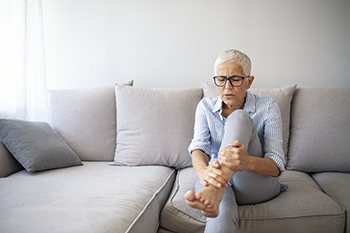
Arthritis has long been considered an ailment of the elderly, but a variety of other people are actually experiencing some form of arthritis, even children. Arthritis is an inflammation of the joints that produces pain, swelling, and muscle stiffness that often affect the toes, feet, and ankles. Among the causes are the deterioration of cartilage that then endangers the bones, an attack of the autoimmune system, smoking, previous injury, over-exercising or repetitive stress, serious infections, and heredity. There are many types of arthritis, including rheumatoid, psoriatic, osteoarthritis, fibromyalgia, gout, ankylosing spondylitis, lupus and juvenile. The most easily recognizable symptoms of arthritis include pain and swelling in the joints, redness, difficulty in walking or moving the joints, stiffness in the morning, and tenderness to the touch. Many treatments are available that allow you to live with this condition. If you think you or your child may have arthritis, it is a good idea to contact a podiatrist for a complete examination and diagnosis, as well as possible treatment plans.
Arthritis can be a difficult condition to live with. If you are seeking treatment, contact one of our podiatrists from Achilles Foot Clinic. Our doctors can provide the care you need to keep you pain-free and on your feet.
Arthritic Foot Care
Arthritis is a term that is commonly used to describe joint pain. The condition itself can occur to anyone of any age, race, or gender, and there are over 100 types of it. Nevertheless, arthritis is more commonly found in women compared to men, and it is also more prevalent in those who are overweight. The causes of arthritis vary depending on which type of arthritis you have. Osteoarthritis for example, is often caused by injury, while rheumatoid arthritis is caused by a misdirected immune system.
Symptoms
Arthritic symptoms range in severity, and they may come and go. Some symptoms stay the same for several years but could potentially get worse with time. Severe cases of arthritis can prevent its sufferers from performing daily activities and make walking difficult.
Risk Factors
If you suspect your arthritis is affecting your feet, it is crucial that you see a podiatrist immediately. Your doctor will be able to address your specific case and help you decide which treatment method is best for you.
If you have any questions, please feel free to contact one our office, located in the South of Calgary, Alberta. We offer the newest diagnostic and treatment technologies for all your foot care needs.
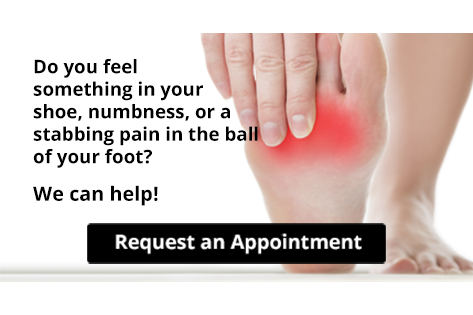
Suffering from this type of pain? You may have the foot condition known as Morton's neuroma. Morton's neuroma may develop as a result of ill-fitting footwear and existing foot deformities. We can help.